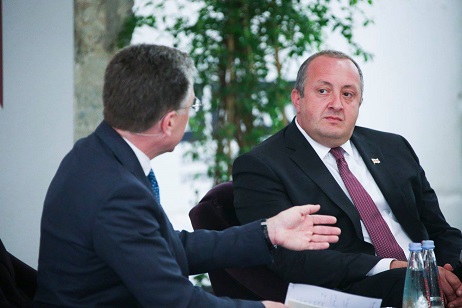World experts discuss European security at Tbilisi conference

Political and security leaders from the United States (US), Western Europe, Georgia and the wider Euro-Atlantic community are gathering in Tbilisi to discuss the challenges facing Europe’s eastern nations, and uncover strategies to move forward.
Georgia’s capital is today hosting the high-level international conference Europe's Changing Geostrategic Landscape after the Warsaw Summit.

The event officially opened this morning with welcoming speeches by Georgia’s President Giorgi Margvelashvili and McCain Institute president and former US Permanent Representative to NATO Kurt Volker.
For the next two days some of the world’s most influential decision-makers will discuss global security threats and challenges, as well as the importance of Euro-Atlantic integration of countries like Georgia, Ukraine and Moldova in this process.
One of the most distinguished guests, set to arrive tomorrow, is NATO Secretary General Jens Stoltenberg.
The aim of the conference, coming a few months after the NATO Warsaw Summit, was to explore the changing geo-strategic landscape; encourage dialogue between countries most affected by the new realities in Europe and discuss existing/possible implications on their security, economic and democratic development; and design a vision and strategy for short, medium, and long term security.
The event officially opened this morning with welcoming speeches by Georgia’s President Giorgi Margvelashvili and McCain Institute president and former US Permanent Representative to NATO Kurt Volker. Photo by the President's press office.
For the last 25 years we have enjoyed great achievements … and today our country is an important part of discussions on regional stability,” Margvelashvili told the audience.
He said Georgia had made significant progress in recent years towards Euro-Atlantic integration, and he promised the country would continue on this path.
He also said stressed Georgia had contributed greatly to preserving European security and the world should be aware of the vital role Georgia currently played. He stressed every nation’s allies and partners must respect each other’s choices.
Georgia has already been punished for its Western choice, which is unfortunate for everyone … [and] currently NATO is having a hard time,” he said.
NATO is a global defence leader but it too faces challenges [and now] dialogue is needed to we can find the answer as to how we can ensure NATO security in the world.”
Georgia’s PM: No compromise will be made regarding Georgia’s sovereignty

Georgia's Prime Minister Giorgi Kvirikashvili (L) and Senior Director for Human Rights and Democracy at The McCain Institute for International Leadership David Kramer. Photo by the PMs press office.
One of the key speakers at the conference was Georgia’s Prime Minister Giorgi Kvirikashvili. He said normalisation of relations with Russia and finding a long-term solution to the existing tension was crucial, however he fully ruled out any compromise regarding Georgia’s territorial integrity and sovereignty.
He explained that by "sovereignty” he meant Georgian people’s sovereign decision regarding the country’s pro-Western vector. Kvirikashvili said this decision reflected the nation’s will so it was impossible to change Georgia’s pro-western course.
Despite this we want to send this message to Russia: We should not get involved in another conflict and we should especially avoid a military escalation [of the current situation],” Kvirikashvili said.
The PM noted Russia had a very strong influence on the de facto governments of Georgia’s two occupied Abkhazia and Tskhinvali (South Ossetia) regions and human rights were often violated in these regions and near the occupation lines, which was a threat to the Georgian Government and the country's international image.
Kvirikashvili also spoke about Georgia’s visa liberalisation and said he hoped the country would be granted a visa waiver to the EU before the October Parliamentary Elections. Being granted visa liberalisation to the Schengen area would greatly increase pro-Western aspirations in Georgia and prevent pro-Russian forces from using this visa waiver delay in their favour.
Georgia’s energy security was another topic Kvirikashvili mentioned and he stressed the country had "exemplary relations” with nearby Azerbaijan in this field. Georgia's PM also briefly mentioned Russian energy giant Gazprom and said there was no reason for "political speculations” that Georgia was going to cooperate with Gazprom.
We have very good relations with Azerbaijan’s SOCAR and it is strategically important for Georgia to maintain these relations because we have seen many times in the past that Gazprom’s gas was used for political goals,” he said.
Georgia’s Parliament Speaker: "Russian soft powers more active now than ever”
Georgia’s Parliament Speaker David Usupashvili was another speaker at the conference. He talked about Russia’s influence on its smaller southern neighbour.
"In Georgia there has never been such a massive attack by the Russian soft powers as now,” he said.
Usupashvili said Russian propaganda and pro-Russian political subjects were strengthening in Georgia and to combat this, the country’s pro-Western forces needed to put more effort in uniting and standing together as one.
Instead of pro-Western parties confronting each other, which opened to door to allowing pro-Russian forces to take an advantage of the situation, Usupashvili urged greater cooperation and he called on Georgia’s allies to offer greater support.
Other high ranking officials taking part in the conference are:
- Prime Minister of Georgia Giorgi Kvirikashvili;
- NATO Secretary General Jens Stoltenberg;
- US Army Europe Commander Ben Hodges;
- US Ambassador to Georgia Ian Kelly;
- US Ambassador to NATO Douglas Lute;
- UK Permanent Representative to NATO Adam Thomson;
- Minister of Foreign Affairs of Georgia Mikheil Janelidze;
- Ukrainian Rada Member Mustafa Nayyem; and
- Ukrainian Rada Member Sergii Leashchenko.
The international conference in Tbilisi was organised by the Economic Policy Research Centre (EPRC) and The McCain Institute for International Leadership.
 Tweet
Tweet  Share
Share